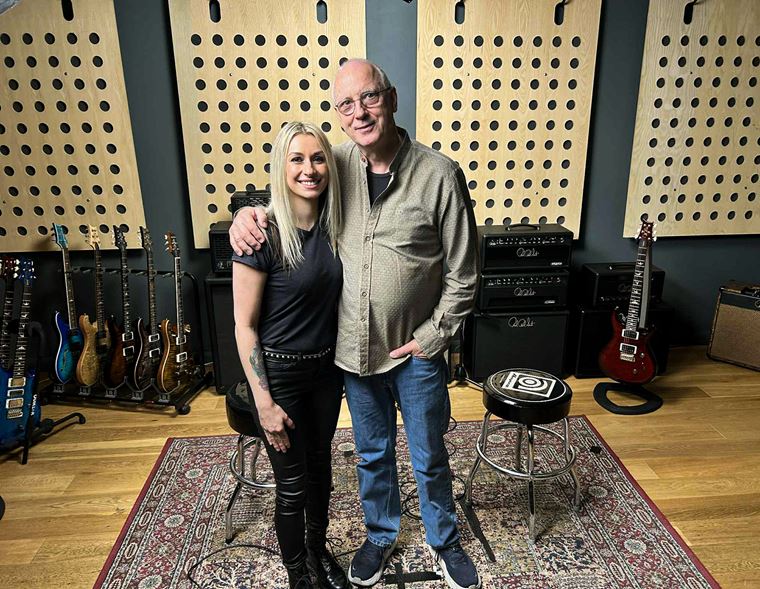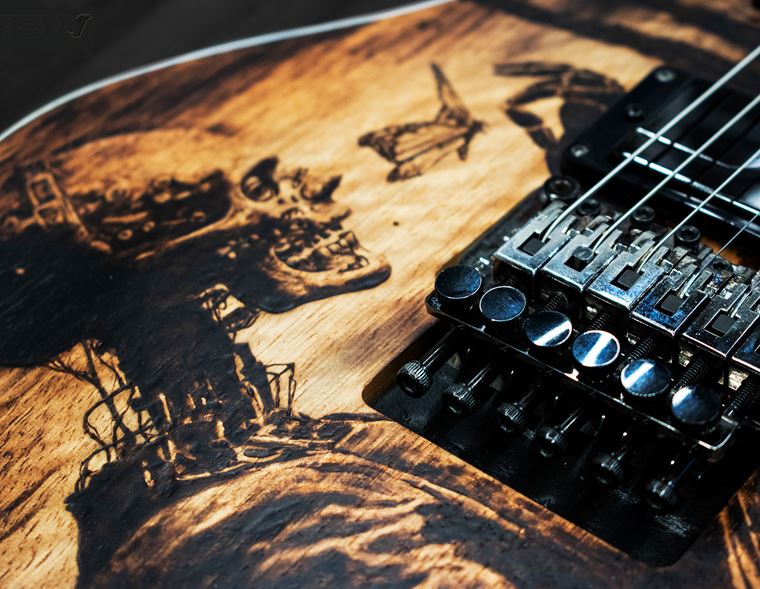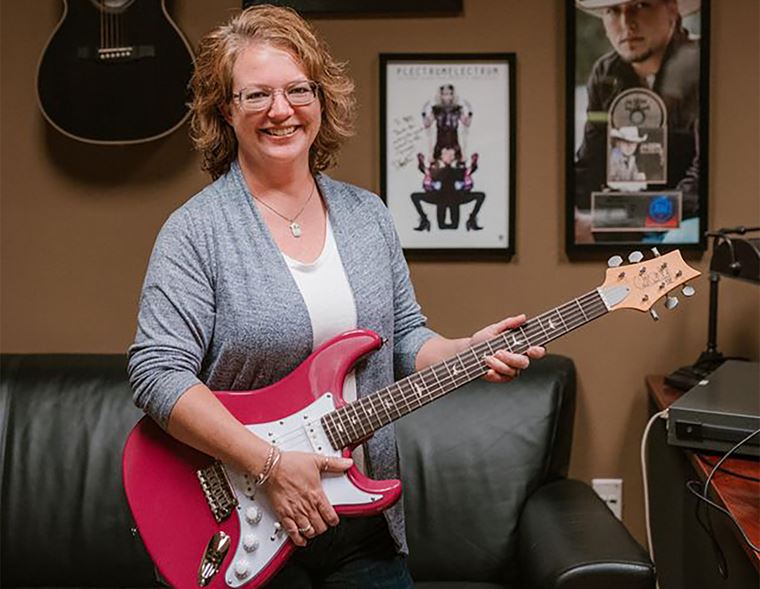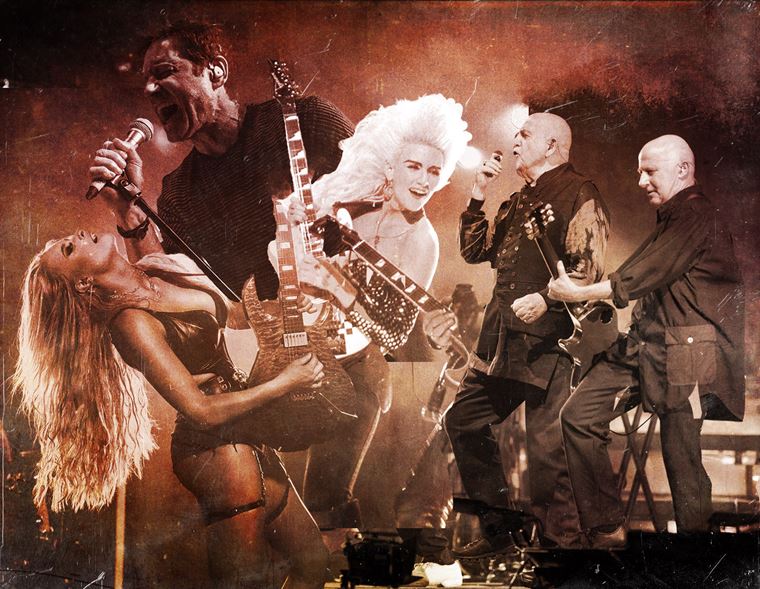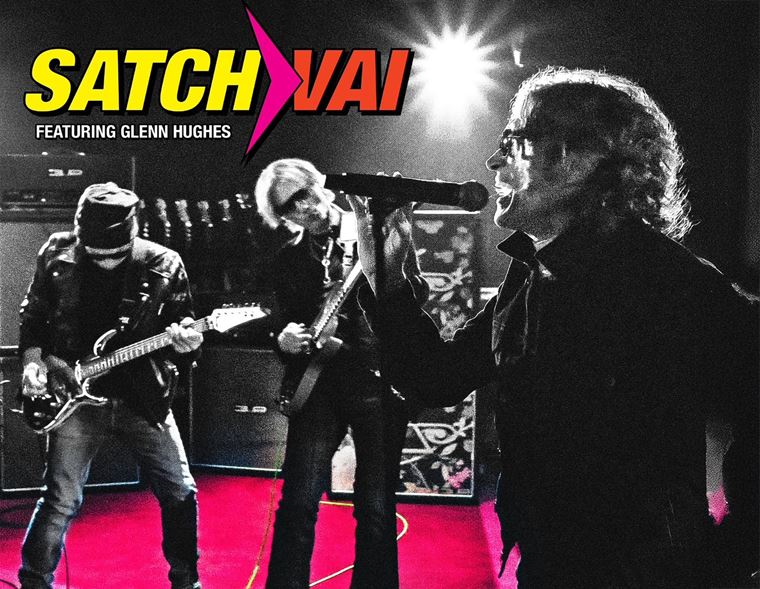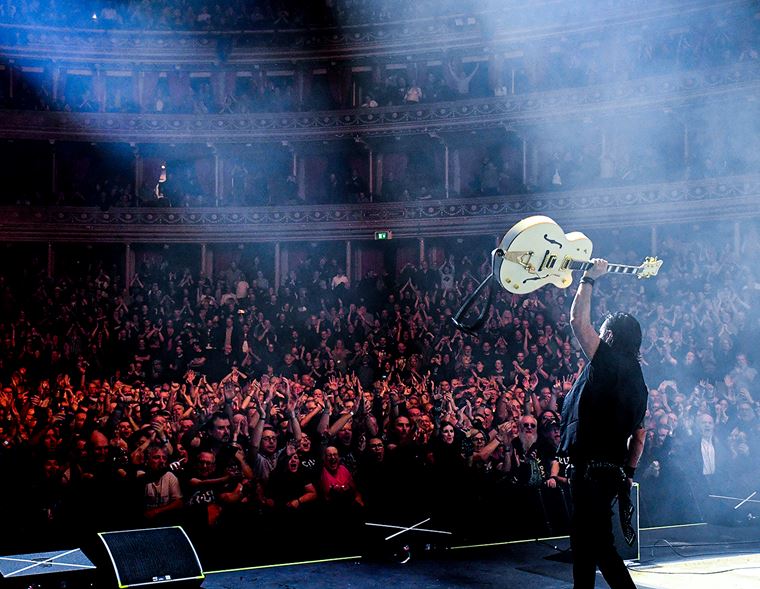The Aristocrats: GUTHRIE GOVAN Talks Touring, Hans Zimmer and MORE!
He’s guitar royalty for anyone with even a passing interest in the six-string lifestyle. He’s the favourite guitarist of your favourite guitarist. His day-gig is as guitar maestro to Hollywood’s number one composer, Hans Zimmer, and he’s a part of The Aristocrats, a three-man power trio of jaw-dropping improvisational brilliance.
He’s Guthrie Govan, and we’re quite sure he’d be cringing about this intro if he were sat next to us right now, given how humble and unassuming he is. He’s a guitar playing giant though, and we were more than happy to take part in our second email Q & A with him (check out our first Guthrie Interview if you haven’t yet seen that one yet) as The Aristocrats prepare for a year of touring across the globe.
The band, completed by bassist Bryan Beller (hot off the back of an incendiary tour with Joe Satriani) and drummer Marco Minneman (Steven Wilson, Steve Hackett) are separately some of the finest musicians on the planet, but as a threesome, they are even more than the sum of their parts. Quite rightly toted as a rock supergroup, anyone who loves music that reaches beyond the realms of most genres simply needs to see The Aristocrats in action whenever the chance arises: each player is hotly in demand, so time is precious for the trio to play together. The tour begins in the UK on the 12th May, so don’t miss out!
As mentioned, we recently sent through a few questions to Guthrie. Our initial focus was of course on the Aristocrats tour, but we wanted to know more about his work with Hans too, particularly on the recent Oscar-winning Dune soundtrack. As ever, Guthrie was happy to field our questions, delivering back a set of fascinating answers that revelaved much and shared much more!
Guthrie Govan Interview
Guitarguitar: On this forthcoming Aristocrats tour, I’ve heard that you’ll be playing unreleased material. Are these finished pieces, or is the public performance of them a part of the process, to sort of ‘test’ the songs and refine them before committing to a recording?
Guthrie Govan: Last year, we “road-tested” a couple of our new songs prior to doing any tracking for the new album but by this stage, we’ve actually recorded our final studio performances of the tracks and those are the renditions which will eventually appear on the next album… once we’ve found the time to get everything mixed, etc.
Taking that approach for every new song would perhaps risk somewhat spoiling the surprise element of a new release (particularly when not everyone is willing to honour our polite pre-show requests not to film us live and post the footage online!) Nonetheless, it’s definitely interesting to gauge some audience response in advance, plus playing a smattering of “secret” new material also feels like a nice way to thank the crowd for their support.

GG: When writing Aristocrats material, does each member bring ideas to the table? And does every member have equal say about each other’s contributions?
Guth: Everyone in the band is capable of turning their song ideas into fully fleshed-out demos, with complete parts for each instrument, so our “new album” formula traditionally starts with each of us writing and recording three songs in their entirety and then sharing the demo mp3s with each other. Once the “raw material” exists, we just learn it and interpret it as best we can: then we’ll meet up in a recording studio somewhere to work out the finer details. Given that I’m based in London whilst my two bandmates live in different parts of California, it’s hard to think of any other method which would work well for us!
GG: Improvisation seems to be an important element of the Aristocrats. Does this then mean that the recorded album tracks are but one permutation of a given song’s existence? And therefore, is catching a live Aristocrats show essential in getting a rounded experience of the band?
Guth: We really like (and perhaps even need) the idea that our songs can continue to grow and evolve as we take them around the world. In that sense, the studio album version of any given song could be viewed as merely its starting point - the point at which we release the song “into the wild” and then allow it to reveal further details of its true nature to us incrementally, over the course of many performances. Some of our tunes have evolved quite significantly since the album versions were recorded because we try never to play things exactly the same from one night to the next. Subconsciously, I think we all remember certain “happy accidents” which happened onstage and those can sometimes end up becoming a more defined part of the arrangement. We all feel that the interactive/spontaneous element of what we do is an important part of the band’s “chemistry”… perhaps that’s why we still enjoy playing together so much, even after more than a decade of this madness ;-)

GG: What is your current Aristocrats live rig?
Guth: This won’t take long at all! Lately, I’ve been using two of my Charvel GG guitars (Drop D and standard tunings) plugged into a Fractal FM-9 (using a traditional cable - I never really felt drawn to the wireless approach as I essentially spend the whole gig glued to my volume pedal anyhow!) along with a couple of expression pedals. (One of these is a global volume pedal and the other serves a variety of purposes, depending on the preset…) That’s basically the whole rig.
Oh, and for our forthcoming tour, I’ll also be using a couple of Laney LFR212 cabinets, which are essentially FRFR speakers mounted in an enclosure with the form factor of a traditional guitar cabinet. This means I get to benefit from a variety of different speaker models within the Fractal whilst still projecting the sound in a way which should feel familiar to the folks in the front row…
GG: I believe you prefer a thicker plectrum (you mentioned a Red Bear sign pick last time): do you find that that one plectrum can cover all tasks?
Guth: I’ve favoured a thicker pick ever since my early teens. Back in the day, I would buy the pink Dunlop Tortex models and reshape them extensively with a nail file, to get a pointier tip and “speed bevels”. Nowadays, as you mentioned, I have the luxury of a Red Bear signature pick which comes with my preferred shape and feel as standard (and, to my ears, it also sounds better!)
I like to feel confident that my pick won’t make any movements until I tell it to do so: this being the case, the flexibility of thinner picks always frustrated me. At the risk of over-generalising, I find that it’s normally easier to approximate a gentle attack with a thick pick than it is to elicit a more “violent” attack with a thin one - but of course, that’s just me. (The important thing is really just to find out what works best for you - different players can sometimes reach surprisingly different conclusions about questions such as this one.)
Having said all of that, I do also have a healthy collection of atypically thin picks for “studio” purposes and I’ll generally try a few of those options if, for instance, I need to record a “strummy” acoustic part or some such.
GG: You played guitar on Hans Zimmer’s Dune soundtrack. That score contained lots of unusual sounds, textures and even instruments mimicking other instruments. What were your duties on that score?
Guth: I did play some “normal” guitar on that score but most of my duties involved either creating weird/disturbing sound effects (Fractal Axe-FX III to the rescue!) or approximating string sections. Hans wrote a lot of string arrangements for Dune but felt that recording them with non-orchestral instruments would somehow help to evoke a more believable sense that the plot was unfolding on a different planet so I recorded a lot of massively multitracked E-Bow/slide/feedback parts…
GG: Is it true that some of the bagpipe parts on the Dune soundtrack are actually your guitar?
Guth: One night, Hans emailed an audio file to me and asked if I could replicate its melody but in the style of “a thousand drunk bagpipers staggering home after the pub.” This struck me as a somewhat unusual request to send to a guitar player but, given that we were all in the middle of a lockdown at the time, I reasoned that it couldn’t hurt to spend a little time seeing if I could tackle this bizarre and impossible-sounding mission.
In the end, I found myself using the monophonic synth block on the Fractal (along with, I think, a tiny amount of fuzz) and then stacking up a lot of different takes, subtly varying the EQ for each new pass. The other thing which seemed to help was trying to harness the sonic artefacts which happen when the synth block’s pitch tracker fails to track the note properly… it’s hard to describe but I found a certain way of attacking the string which would momentarily confuse the pitch-tracking module and the resulting glitchiness seemed to mimic some of the unique sonic properties of bagpipes. So… I just did my best, sent off the resulting stems and then thought no more of it.
When I finally watched the film, I actually assumed that the bagpipes were real and that my choir of “drunk” guitar approximations had never made it into the final soundtrack but Hans informed me that the opening few bars of that scene were indeed me! I guess the sounds you create can sound quite different after you’ve had a little distance from them and forgotten about the “process” which led to their creation!
GG: I love your slide playing on pieces like Thunderbirds from Thelma & Louise. You seem to use the same signature Charvel guitar for both slide and non-slide playing, would that be correct? You don’t require a guitar that’s specially set-up for slide? If so, I’d love to hear about your slide technique (do you have a light touch, for example) because the sound is wonderful!
Guth: Thanking you kindly! I use the D’Addario glass slides, which are something along the lines of those old Coricidian pill bottles… the weight feels natural to me and I like the tone. In the context of the Hans gig, I frequently encounter situations where I have to combine slide and “normal” playing styles within a single track so I really need to use the same guitar for both techniques.

My guitars are typically set up with what most people would consider to be a low action but I did recently move up to .011 gauge strings, which “fight back” a little more against the slide and seem to solve most of the fret rattle problems which so frequently plague players who might need lower action for other facets of their playing vocabulary. In terms of lightness of touch: I’m honestly not sure how to describe it but it’s one of those things where it’s best to explore a few different playing approaches and just remember how it feels when the results are sounding right.
GG: There’s a wonderful video of you online adapting your guitar solo live after breaking a string: what a recovery! What’s the worst thing you’ve had happen to you onstage?
Guth: In all honesty… probably that! I’m guessing that you’re referring to the Thelma & Louise incident from HZ’s “Roman arena” gig in Orange (France) but the same thing also happened to me more recently, during a solo spot during the very first show of this current EU tour, and it was only slightly less distressing!
I suppose the ultimate mission in those situations is to make sure that your problem on stage doesn’t become the audience’s problem so… all you can really do is your best.
GG: On the Zimmer tours, you play with incredible musicians such as cellist Tina Guo and violinist Rusanda Panfili. Since it’s always good for guitar players to listen to other types of soloists, did you pick up anything interesting and useful from these players?
Guth: There’s a lot of interesting musical exchange going on within this band, as it’s such a multicultural operation and each member has a different area of expertise, enabling them to bring something unique to the metaphorical table. I’ve absorbed all kinds of unexpected inspiration from just listening to my bandmates talking about the music they play when they’re not performing in Hans’ band! (On a recent bus ride, for instance, I discovered that our woodwind player Pedro Eustache turned out to be unexpectedly knowledgeable about flamenco rhythm cycles…)
GG: Going back to improvisation, you are well known for your excellent improv skills. Do you have any simple but effective tips you could pass on to our readers in order to help them improvise in more interesting ways?
Guth: I talk about this stuff quite extensively during guitar clinics: I guess a concise version of one recurring theme would be that I always recommend working on your ear, with the goal of becoming a player who can imagine a melody internally and then translate it onto the fretboard as effortlessly as possible. If you can emulate the sounds you hear around you, you can then apply the same skill to express the sounds you hear in your own head, as opposed to relying on memorised licks.
I find that it’s also healthy to maintain a varied, multi-genre listening diet… the ideas which come out of you are very much informed by what you listen to so I think keeping your mind open to a range of different musical inspirations can somehow feed your imagination and ensure that you never run out of new things to “say” on your instrument!

What insights! We’re very thankful to Guthrie for taking the time to answer our questions so eloquently, and for sharing in such depth! We love that story about the ‘bagpipes’ haha!
Catch the Aristocrats on tour: it’s an experience not to miss! The tour begins on 12th May in Glasgow and travels the UK and Europe before a break, then picks up again in October for another round of Euro gigs. You’ll find dates, links for tickets and more at the official Aristocrats website.
Thanks for reading, and remember to search our guitarguitar Interviews section for well over 150 exclusive interviews with people like Steve Vai, Tommy Emmanuel, Joe Satriani, Steven Wilson and many more!


